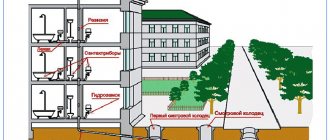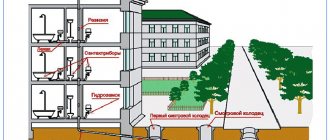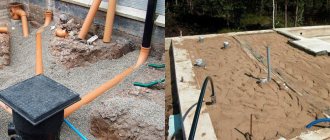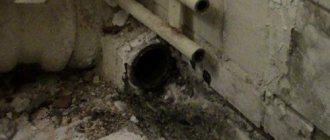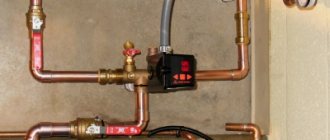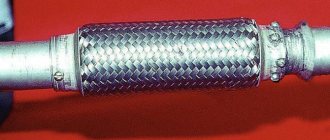Despite the fact that the law establishes the obligation of citizens to pay for utilities, not everyone strives to fulfill it. Accordingly, debt arises, sometimes reaching huge amounts. In such situations, service companies have to take radical measures - install plugs in the debtors' sewer systems. Is this legal? Let's find out the answer to this question further.
The fight against defaulters
Each apartment in any multi-story building is provided with water, electricity, and sewerage. When arrears arise, residents are notified of this with a warning to take action. However, such notices do not always have an effect on defaulters.
To disable certain systems in the apartment, you need access to it. As a rule, defaulters do not allow representatives of service companies to enter. Accordingly, the only way out is to go to court.
Meanwhile, relatively recently, housing departments began to use a new, rather radical method of dealing with non-payers: installing a plug on the sewer. For debtors, the legality of this measure seems highly questionable.
It is worth saying that to implement it, housing department representatives do not need access to the apartment. The legality of sewer plugs for debtors is confirmed by a number of regulations (they will be discussed below).
How to force debtors to pay for utilities
It is prohibited by law to limit the supply of electricity, hot or cold water, as well as gas and heat. The only way to influence malicious defaulters of utility services is to limit or suspend water supply to debtors, as well as water supply, which is legally prescribed in Article 21 of Federal Law No. 416 of December 7, 2011 “On Water Supply and Sewage.” This article of the law states in plain text that if a consumer of utility services has a debt for water supply and sewerage for more than two billing periods, it is allowed to impose restrictions on the debtor or suspend sewerage and water supply. This state of affairs allowed management companies, using special technical means, so-called “plugs,” to limit or suspend water drainage in debtors’ apartments. However, a reasonable question arises to what extent this method of influencing non-payers of the CU affects the rights and interests of the remaining residents of the house.
Features of the measure
According to current legislation, service companies can only temporarily suspend the supply of certain raw materials (water, electricity). Moreover, such measures are applied to persons whose debt has accumulated for more than six months.
Meanwhile, another method of dealing with defaulters has recently become widespread. Installing a drain plug for debtors is a very effective measure. The fact is that the maintenance of the apartment is not actually suspended. However, residents will not be able to use water.
For debtors, a sewer plug is an obstacle to using the bathroom and kitchen faucet. Because of this, wastewater is not discharged from the sewer into a common riser.
Operating principle
Sewer plugs for debtors are special technical devices that limit the removal of wastewater from the apartment. Residents will be able to feel the effect of such funds quickly enough.
As practice shows, on average, about 300 liters of liquid waste flows into the common riser per day from one apartment with three citizens living in it. It must be assumed that a sewer plug can turn into a real problem for the debtor. For the first couple of days, you will still be able to use the amenities, but in the following days it will be very difficult, since the entire drain will begin to rise from the barrier and will eventually flow back into the apartment.
Connection
Only representatives of the water utility, management company or other utility authority can reconnect the drainage pipes to the system.
If the sewer system in the apartment was blocked using one of the devices (“Octopus”, “SOV”), you need to pay the debt, provide the accounting department with a receipt for repayment of the debt, and notify the responsible persons.
Then you should call workers who can remove the blocking device from the pipes. To carry out such work, you will definitely need special equipment; only professionals have it .
ATTENTION! Even if private companies offer to arrange illegal drains, advertising their services, you should not use their services. Improper work will lead to disruption of the sewer system throughout the riser.
In the case where there is no money to pay off debts, and the operation of the apartment requires sewerage, it is still better to use the services of craftsmen from a private company than to carry out the work yourself. Without professional knowledge and tools, it is easy to damage the common riser, which will make it impossible for the entire entrance to use drainage .
Kinds
Currently, solid or lattice sewer plugs are used. For debtors, in fact, the type of device does not matter much.
However, with lattice plugs it will be a little easier to survive the sanctions of the service company. Such a device allows liquid waste to pass through and retains solid waste. A solid plug will prevent all drains from escaping.
Sewer shutdown procedure
Despite the legality of shutting off sewerage for non-payment of utilities, no service organization has the right to do this without notifying the debtor and earlier than 30 days after delivery of the paper. When the drainage system is blocked, minutes count. This is determined by the natural needs of the human body. Therefore, it is better to challenge the actions of utility companies before turning off the system than after it.
If your financial situation is very bad, it is better to enter into an agreement with the management company for installment payment of the debt. This solution is optimal and legal for both parties.
Installation nuances
Installation of sewer plugs for debtors is carried out in compliance with a number of requirements. Firstly, the sewer pipes of neighboring apartments should not be affected. The drainage outlet must be closed exclusively for one apartment.
Before putting a plug on the sewer system for the debtor, the absence of branches in the pipe is checked. Representatives of the housing department or management company must collect all available information about the condition of the sewerage system. The exit to the pipe must be safe.
How to install
Equipment for blocking sewerage systems for debtors is not installed suddenly, at the whim of the management company’s employees. First, you must send the debtor a notice of the debt. Then, if no action occurs on his part, a warning follows about restricting the use of the drainage system. The last step is to notify you of the date and time the plug will be installed.
The procedure takes place within a few minutes. First, the riser is examined and a branch to the debtor's apartment is discovered. Then a device for blocking the sewer is lowered on a cable and fixed in a given place. This completes the first part of the process.
After paying the debt (or concluding an installment agreement), the apartment owner submits an application, according to which the management company employees must remove the plug within 2 days. The fact of payment does not mean automatic removal of the device; this must be remembered and immediately notified to company employees. If there is any delay in removing the plug, this becomes a reason to file a lawsuit against the actions of the management company.
Notice
Is it legal for debtors to install a drain plug without notifying them? No. The defaulter must be informed of the upcoming work.
If, after all, the device was installed, but the owner of the apartment was not notified, he has the right to challenge the actions of the service company. There are quite a lot of such cases in judicial practice.
Installing sewer plugs to debtors without notice entails extremely negative consequences for the service organization. The court, of course, will not write off the debts, but may impose an obligation to compensate the owner for damage (including moral damage). The defaulter can subsequently use the amount of compensation to pay off the debt.
Notification is sent to the owner in writing. The notice warns the subject of the restriction or suspension of the provision of sewerage services if the debt is not repaid within 30 days from the date of receipt of the letter. The notice must be delivered in person against signature or sent by registered mail with acknowledgment of receipt. Other means of communication may be used, but they must provide confirmation that the defaulter has received the warning. Otherwise, it will be difficult for the service company to prove the legality of its actions.
Arbitrage practice
In some cases, defaulters or public housing estates try to challenge in court the restriction or suspension of water drainage for non-payment of utilities . Let's consider cases when the court satisfies their claims or rejects them.
In the Resolution of the Thirteenth Arbitration Court of Appeal dated January 20, 2015 in case No. A56-19200/2014, the judge ruled in favor of the State Housing Property Inspectorate, which, after an unscheduled inspection, issued an order to the housing cooperative. The GZHI order was based on the fact that the housing cooperative installed additional equipment that was not provided for in the project, the Rules and Standards for Housing Maintenance, the Housing Code of the Russian Federation and clause 1.6 of the Rules and Standards for the Technical Operation of the Housing Stock (Decree of the State Construction Committee No. 170 of September 27, 2003).
The housing cooperative tried to challenge this order of the Housing Housing Inspectorate in court, since many apartment building residents did not pay for utilities for a long time. As a result, the cooperative had to install “plugs” on the debtors’ individual risers and cut off individual apartments from the sewerage system. But the court refused to satisfy the housing cooperative’s demands, basing its decision on the fact that:
- the cooperative had to separately calculate the debt for each type of corporate capital and, before the restriction, notify the debtors, demanding to repay the debt (clause 118 of the RF PP No. 354);
- engineering systems that are part of the common property of the owners of premises in apartment buildings must comply with sanitary and epidemiological safety requirements (clause 9.2 of SanPiN 2.1.2.2645-10).
Thus, the deliberate suspension of water drainage due to the work carried out by housing cooperatives to install “plugs” on individual risers makes the apartment building unsuitable for habitation and does not comply with sanitary and epidemiological safety standards.
However, there is a completely different court decision in a case with a similar plot. Thus, in the Resolution of the Thirteenth Arbitration Court of Appeal dated February 5, 2015 in case No. A56-27564/2014, the judge ruled in favor of the housing cooperative. The court considered that upon prior notification to the debtor of the introduction of special measures in relation to it, the cooperative has the right to limit or suspend water disposal.
The court found, based on the conclusion of the forensic examination center, that the actions of the housing cooperative to install “plugs” to limit water drainage to the engineering systems of the apartment building do not change the parameters of the residential building, do not lead to damage to the debtor’s property and do not violate sanitary and epidemiological safety requirements . Thus, living conditions remained suitable, and the remaining owners of the premises in the house were not affected by the actions of the cooperative.
It is important to note here that the installation of “plugs” to limit water drainage can only be done in those sections of utility lines that do not belong to the common property of the owners of premises in the apartment building. Also, the installation of “plugs” should not lead to damage to the debtor’s personal property.
The watchful eye of GZHI
104141
Algorithm of actions
Before installing the plug, a specialist from a service organization studies the connection diagram of sewer pipes and inlets to a specific apartment. This is necessary in order to know the number of drains and, accordingly, the number of plugs. If there are several drains, then installing one plug will not bring the expected effect - residents will use another drain.
After examining the sewerage connection diagram, the specialist determines the type of device that will be used. In addition, a specific section of the pipe is installed into which the plug will be inserted. As a rule, the main riser is used. It goes from the general sewer drain to the toilet.
After preparation, the actual installation begins. A special manipulator, LEDs and a miniature camera are launched into the pipe. The devices are controlled by a specialist operator. After completing the necessary manipulations, the plug is installed in the selected location.
What types of blocking can there be?
Several plugs - blockings - are produced. Each of them has both its pros and cons. The most popular are “Octopus” and “Whale”.
The first sewer blocking system that we will consider is called “Octopus”. It consists of: a video camera, a probe (several meters), a blocking device and a manipulator. Its advantages include:
- presence of a video camera;
- the ability to completely or partially block the sewer riser.
It is lowered into the sewer pipe through the ventilation hole and partially or completely blocks the outflow of wastewater. But this does not disturb the geometry of the pipe, and other residents do not experience any inconvenience.
Steel is used to make this plug. It is resistant to mechanical and chemical damage.
The second system for blocking sewers, “Kit”, consists of: a probe, a control panel and a camera. Its advantages include:
- the presence of LED bulbs - this makes it easier to find an apartment;
- the presence of a compact control panel - thanks to this, there is no need to rent a car for specialists.
There are other types of blocking:
- "TerminatorProfi";
- “GLOT” – consists of a cable, at the end of which there is a manipulator and a miniature video camera;
- “SOV” - assumes the presence of a plug in the form of a sleeve made of polymers, which is pressed into the debtor’s section of the pipe and closed with a lock.
The condition for lifting the blocking is full payment of the debt to the management company.
Removing a fixture
Some defaulting property owners, not wanting to be left without amenities, remove the sewer blockage on their own. Are debtors acting legally? In principle, their actions cannot be called illegal.
Of course, the best way to get rid of inconvenience is to pay off the debt. In this case, the specialists of the service organization will remove the plug themselves. But, unfortunately, some owners choose a different method.
The plug can be removed from the sewer mechanically or chemically.
In the first case, it is necessary to dismantle the area adjacent to the location of the device. Next, the plug is removed manually. The second option involves the use of special tools, for example, for cleaning pipes. Such a remedy is “Mole”. However, it must be said that it is effective if a metal plug is installed. It should be borne in mind that the effect of the product will occur only after a certain time (after a week, and in some cases more).
There is another alternative option: you can contact a specialized company that deals with sewer installation and cleaning. However, the cost of the work can be quite high. In this case, it is really easier to pay off the debt.
Removing the plug: the price of the issue
Before you find out how much it costs to remove a drain plug, try to solve the problem in a more legal way. Find an opportunity to pay your utility bills or ask for an installment plan from the management company.
There is demand - there is also supply. If paying for the removal of the plug seems more economical to you, you can contact the appropriate services. Service companies price their services from 2.5 to 5 thousand rubles. Private craftsmen charge less - 1.5-2 thousand rubles .
If it is necessary to install an anti-plug, you will need to pay an additional about 3 thousand rubles. But how to find out whether it is worth applying for the provision of this type of service, everyone decides for himself.
Features of the mechanical method of removing the plug
This option is advisable to use if the toilet has been recently installed or is bolted. If the plumbing fixture is old and filled with solution, then you should not even try to remove it.
As a rule, in modern apartments, toilets are bolted. Accordingly, dismantling the plumbing fixture will not be difficult. It is necessary to unscrew the bolts and disconnect the bell. In the first connection after it there will be an exit to the riser. You can see a plug in this area.
It is important to be careful when performing work. The plug must be pulled out and not pushed further into the pipe. Otherwise, the entire sewer riser will be blocked.
If the length of the branch is short, the plug can be grabbed with pliers. If the pipe is long, you will have to make a hook. You can also use a fishing harpoon (if available). You need to hook the plug and carefully pull it out. In this case, you need to try to avoid deformation or damage to the device, otherwise it will be difficult to pull it out.
Normative base
Let's return to the question of whether it is possible to put plugs on sewer lines for debtors. It was said above that the legality of such a measure is confirmed by a number of regulations. Let's consider some of their provisions.
It is worth saying that at the initial stages of introducing this measure into practice, the authorities of some regions opposed it. However, over time, the attitude of city administrations to this issue began to change.
Turning off the water supply or blocking the sewer pipe does not make the living space uninhabitable. Accordingly, such actions in themselves do not contradict regulations. At the same time, the legality of the implementation of this measure is ensured by proper notification of the apartment owner about the proposed measures.
Regulatory acts confirming the legality of installing a plug include the Housing and Civil Codes, as well as government regulations.
As established in Article 155 of the Housing Code, persons living in residential premises are required to make utility payments in full on time. The Government Decree of 2011 (No. 354) established the possibility of applying restrictive measures against entities evading responsibilities related to the maintenance of housing. At the same time, it is allowed to suspend the supply of utilities, except for heating and cold water supply. There are no restrictions regarding sewerage.
The need to introduce the measure was due to the accumulation of huge amounts of debt. Thus, at the end of 2012, the debt of owners to public utilities reached 113 billion rubles. The authorities were forced to take radical measures to combat persistent defaulters.
Blog
One of the most effective measures to combat non-payers for housing and communal services is the installation of sewer plugs. Usually 2-3 days spent in an apartment “without a toilet” help the owners realize how important it is to pay off the debt. However, there is also a downside to the coin, because installing a plug can result in a fine for the management company for violating licensing requirements. In this article, we will take a closer look at Resolution of the Supreme Court of the Russian Federation dated March 5, 2021 No. 47-AD19-2, in which the court found that the actions of the management organization to install the plug constituted a violation of licensing requirements.
The management company of Orenburg notified the subscriber of the presence of an overdue debt for the maintenance of residential premises in the amount of 49,566 rubles 5 kopecks
.
The notice, among other things, indicates that the subscriber will be obligated to reimburse the cost of services of a specialized organization for the suspension of public sewerage services in the event of suspension of this particular service. After which, the management organization introduced measures to suspend public utilities (sewage) by installing a limiting device (plug) on the individual allotment of the defaulter’s apartment
.
The debtor did not like such actions, and he contacted the prosecutor's office
, which forwarded the complaint to the state housing supervision authorities. As a result of the inspection carried out by the state housing supervision authorities, it was concluded that the suspension of public services (sewage) by installing a plug was carried out in violation of the established procedure.
By the decision of the magistrate, upheld by the decision of the district court of the city of Orenburg and the decision of the deputy chairman of the Orenburg regional court dated August 16, 2018 No. 4a-480/2018, the general director of the management company was found guilty of committing an administrative offense under Part 2 of Article 14.1.3 of the Russian Code Federation on administrative offenses, and will be subject to administrative punishment in the form of an administrative fine in the amount of 50,000 rubles.
The management organization tried to challenge these court decisions in the Supreme Court.
When considering the case, the Supreme Court of the Russian Federation, with reference to Part 2.3 of Article 161 of the Housing Code of the Russian Federation, indicated that when an apartment building is managed by a management organization, it is responsible to the owners of the premises in the apartment building for the provision of all services and (or) performance of work that ensure proper maintenance common property in a given building and the quality of which must comply with the requirements of technical regulations and rules established by the Government of the Russian Federation for the maintenance of common property in an apartment building
, for the provision of utility services depending on the level of improvement of a given house, the quality of which must meet the requirements of the rules established by the Government of the Russian Federation for the provision,
suspension and limitation of the provision of utility services to owners and users of premises in apartment buildings and residential buildings.
According to subparagraph “a” of paragraph 117 of the Rules for the provision of utility services to owners and users of premises in apartment buildings and residential buildings, approved by Decree of the Government of the Russian Federation dated May 6, 2011 No. 354, the contractor limits or suspends the provision of utility services, having previously notified the consumer, in the event incomplete payment by the consumer for utility services in the manner and within the time limits established by these Rules.
Further, the RF Armed Forces quotes the norms of paragraphs 114-119 of Rule 354, which regulate the procedure for limiting and suspending public services.
Agreeing with the conclusion of the courts that the act committed by the director of the management organization contained the elements of an imputed administrative offense, the Supreme Court of the Russian Federation proceeded from the following:
- The wording given in the notification indicates non-compliance with the norms of paragraphs 118, 119 of Rules No. 354, from which it follows that the consumer’s debt for each type of utility service is subject to calculation separately, and a specific (not fully paid) utility service is subject to limitation or suspension in the event of incomplete payment by the consumer service.
- There is no evidence in the case materials that the management organization sent the owner of the said apartment a notice of debt for the utility service, sewerage.
- Within the meaning of these norms, the suspension of the provision of a utility service must be preceded by a restriction on its provision
. If there is no technical possibility of introducing a restriction, the provision of a utility service may be suspended without first introducing a restriction.
- In the case under consideration, the question of the presence or absence of the technical possibility of introducing restrictions on the provision of utility services is not reflected in the notification dated July 11, 2017.
There is no information in the case materials that the volume (quantity) of supply of a utility resource was temporarily reduced to the consumer and (or) a schedule was introduced for the provision of utility services during the day. The provision of public water drainage services by installing a limiting device (plug) was suspended by the company, bypassing the stage of restricting the provision of public services in the absence of an indication of the technical impossibility of introducing a restriction, which contradicts the provisions of paragraph 119.114 of the above Rules.
- In accordance with paragraph 122 of Regulation No. 354, actions to limit or suspend the provision of public services should not lead, among other things, to a violation of the established requirements for the suitability of residential premises for permanent residence of citizens
.
- In paragraph 40 of the resolution of the Plenum of the Supreme Court of the Russian Federation dated June 27, 2017 No. 22 “On some issues of consideration by courts of disputes regarding payment for utilities and residential premises occupied by citizens in an apartment building under a social tenancy agreement or owned by them by right of ownership,” in particular, explained
, that
the mere presence of debt to pay for a utility service cannot serve as an unconditional basis for suspending or restricting the provision of such a utility service.
The actions of the utility service provider to suspend or restrict the provision of utility services must be proportionate to the violation committed by the tenant (owner), not go beyond the actions necessary to suppress it, not violate the rights and legitimate interests of other persons and not create a threat to the life and health of others.
Fortunately, the courts do not always side with the offended owners, for example, in the Decision of the Zasviyazhsky District Court of Ulyanovsk dated May 18, 2021 in case No. 2-1654/2018 (on the claim of the debtor), the court indicated that the management company , which provides utility services to residents of an apartment building, has the right to limit the provision of these services to residents of a separate apartment if they have significant debt in payment for the relevant services, in the manner established by the above rules.
Analyzing the evidence collected in the case in its interrelation and in its entirety, the court came to the conclusion that there were no grounds for recognizing the defendant’s actions in terms of installing a limiting device on the sewer pipe as illegal.
To paraphrase the well-known proverb “Think seven times and check the documents sent to the debtor before installing a plug.”
has developed a unique CRM system for management companies and homeowners associations. All the necessary information about the service is here
.
You can discuss the article and ask questions on our forum or use the form below.
Additional Responsibility
The Government Decree of 2006 (No. 491) provides that the costs incurred by the service organization for debt collection activities are borne by the debtor. In addition, in accordance with current regulations in the field of public utilities, unauthorized intervention in the engineering and technical systems of an apartment building entails the obligation of the culprit to compensate for losses incurred during the restoration of the network.
As for removing the stub yourself, these actions cannot be considered illegal. The fact is that the owner carries out all manipulations from his apartment.
